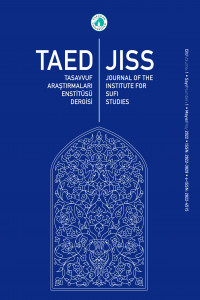The View on Virtue and Vice by Sulṭān Walad: A Comprehension of Iblīs
This article aims to reveal the Sulṭān Walad’s practical thought as a spiritual master and administrator of the Mevlevī order, examining his opinion about Iblīs (Satan). Basically, his writings were intended to preserve and transmit the tradition of his father, Jalāl al-Dīn Rūmī, to future generation of the Mevlevī order. A lot of his interpretative works confirm that he puts the highest priority on further comprehension of Rūmī’s thought. Therefore, it is expected that Sulṭān Walad’s works are based on the thoughts of his father Rūmī and his original mind is more or less restrained. However, unexpectedly, his arguments about Iblīs shows clear distinction from his father’s thoughts. This article focuses on their opinions on Iblīs, analyzing their differences on their theory of vice and virtue. From Sulṭān Walad’s attitude toward Iblīs, we could observe that he considered carefully on vice and virtue as a spiritual master and administrator of the Mevlevī order. Not only did Sulṭān Walad inherit his father’s thought, but he tried to reshape his father’s legacy adjusting to the reality of the order.
Anahtar Kelimeler:
Sulṭān Walad, Jalāl al-Dīn Rūmī, Mevlevī order, Iblīs, Virtue and Vice, Sulṭān Walad, Jalāl al-Dīn Rūmī, Mevlevī order, Iblīs, Virtue and Vice
The View on Virtue and Vice by Sulṭān Walad: A Comprehension of Iblīs
This article aims to reveal the Sulṭān Walad’s practical thought as a spiritual master and administrator of the Mevlevī order, examining his opinion about Iblīs (Satan). Basically, his writings were intended to preserve and transmit the tradition of his father, Jalāl al-Dīn Rūmī, to future generation of the Mevlevī order. A lot of his interpretative works confirm that he puts the highest priority on further comprehension of Rūmī’s thought. Therefore, it is expected that Sulṭān Walad’s works are based on the thoughts of his father Rūmī and his original mind is more or less restrained. However, unexpectedly, his arguments about Iblīs shows clear distinction from his father’s thoughts. This article focuses on their opinions on Iblīs, analyzing their differences on their theory of vice and virtue. From Sulṭān Walad’s attitude toward Iblīs, we could observe that he considered carefully on vice and virtue as a spiritual master and administrator of the Mevlevī order. Not only did Sulṭān Walad inherit his father’s thought, but he tried to reshape his father’s legacy adjusting to the reality of the order.
Keywords:
Sulṭān Walad, Jalāl al-Dīn Rūmī, Mevlevī order, Iblīs, Virtue and Vice, Sulṭān Walad, Jalāl al-Dīn Rūmī, Mevlevī order, Iblīs, Virtue and Vice,
___
- Aflākī, Shams al-Dīn Aḥmad. Manāqib al-ʿĀrifīn. 2 vols. Ankara: Türk Tarih Kurumu Basımevi, 1980.
- ISSN: 2822-3829
- Başlangıç: 2022
- Yayıncı: Üsküdar Üniversitesi
Sayıdaki Diğer Makaleler
Üsküdar Mevlevîhânesi Postnişini Ahmet Remzi Dede’nin Hüznü
Yûnus Emre Günümüz İnsanına Ne Söyler?
Sûfî ve Medeniyet: Tasavvufun Medeniyetler Barışına Katkısı
Türkiye’deki Tasavvuf Çalışmaları Metodolojisinde Yeni Ufuk Arayışları
ʿAyn al-Quḍāt’s Journey of the Heart
Ahmed Avni Konuk’un Fusûsü’l-Hikem Şerhi’ne Göre Yaratılış Bağlamında Ferdiyet Kavramı
Spiritual Humanism: A Call to Creativity in Sufi Studies
Saints in Islamic Ritual Music: Grief for İmam Hüseyin in Alevi Tradition
